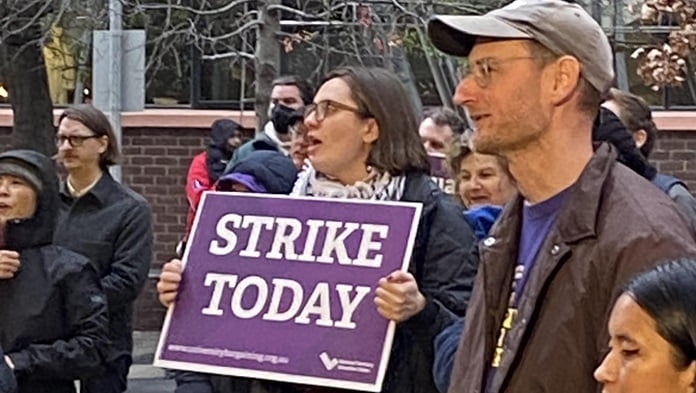MELBOURNE: On 13-14 June, RMIT University’s NTEU members went on their fifth strike during the current bargaining period, which has lasted 13 months.
The walkout and strike rally included speeches from professional and vocational education staff as well as the hand delivery of a vote of no confidence to the Vice-Chancellor’s office, signed by several hundred RMIT staff.
It has been three years since the expiry of the last Enterprise Bargaining Agreement. RMIT staff are fighting for more pathways to permanent jobs for casuals, a rejection of teaching-focused roles and common clauses across higher education and vocational education, as management works on keeping staff divided.
There has been no fair pay offer and RMIT wages have dropped from the middle to the second lowest of any university in Australia. Senior management in vocational education have refused a single bargaining meeting since mid-March and are now preparing another in a long line of non-union ballots. RMIT management have not accepted a percentage figure for the employment of Aboriginal and Torres Strait Islander people that reflects the broader population.
Continuing academic staff are fighting for a 10 per cent increase in minimum research time and a 10 per cent decrease in their maximum teaching time. After the last strike in March, management voiced a willingness to agree to this new workload model. In the latest update on bargaining from management they are “close to an agreement”, though nothing final is in writing.
Members at the strike rally unanimously voted for another strike on RMIT Open Day in August in addition to continuing, indefinite bans on posting final grades into online systems and on the use of a variety of internal HR, financial and administrative university systems. The Open Day strike is set to be a PR and administrative nightmare for RMIT management.
ADELAIDE: About 300 submarine shipyard workers went on strike in early May for a 17 per cent pay rise to reach parity with Western Australian shipyard workers.
The Osborne yard is run by the government-owned Australian Submarine Corporation (ASC) and is set to build AUKUS nuclear-powered submarines.
The strike gives the lie to the Albanese government promises of a jobs bonanza and high pay rates, which has seen SA unions support AUKUS.
SA workers earn about 17 per cent less than colleagues in WA.
Stuart Gordon, Assistant Secretary of the SA branch of the AMWU, said the ASC offered only a 6.75 per cent pay rise for the life of the EBA, which is below inflation.
Negotiations have been going on between the union and ASC for six months.
CAIRNS – MACKAY: About 2000 Wilmar sugar cane harvesters, members of the AWU, held their third one day-strike in late May for a decent pay rise.
The workers had originally asked for a 25 per cent pay rise and dropped that claim by 3 per cent for Wilmar Sugar to come to the party. Wilmar declined the offer and suggested 13.75 per cent over four years, effectively a pay cut at an average rise of 3.43 per cent a year.
As a result of the company stalling, the workers staged their third strike at all eight Wilmar sugar mills in Far North Queensland, from Cairns to Mackay.
Jim Wilson, AWU Queensland Northern District Secretary, said, “We just want our members to be compensated fairly for the work they do at a time when Wilmar is making record profits.”
Wilmar International, a Singapore-based company, bought the Australian-owned conglomerate CSR’s sugar company spin-off, Sucrogen, in 2010.
BRISBANE: The crew of a fuel bunker (tanker) Champion 63, represented by three maritime unions, are launching protected industrial action against their employer BP for a pay rise and rostered time off.
Members of Australian Maritime Officers Union (AMOU), the Australian Institute of Marine and Power Engineers, and Maritime Union of Australia (MUA) voted for strike action on 11 June against BP’s trading subsidiary, ASP.
The crews have been trying to formalise their employment since bunkering on the Brisbane River—refuelling cruise ships—began in February 2023.
They voted up an unlimited number of stoppages of between one and 48 hours.
BP has made more than $40 billion profits world-wide in the past two years.
Paul Gallagher, Assistant Branch Secretary of the Queensland branch of the MUA, said BP had “decided they can’t pay industry standards in Brisbane and want to keep their workers’ wages low”.
Tracey Ellis, Industrial Officer of the AMOU said, “Having to work every weekend because ASP does not have suitable relief arrangements is unacceptable.”
BURNIE: Rolling strikes by dozens of maintenance workers at Saputo Dairy, members of the AMWU and CEPU, took a sharp turn in June when the company flew in scab labour from Germany.
In response, union members went out on a full strike on 10 June and had been out for a week when Solidarity went to press. There is no current return to work date.
The first strike began on 23 April when Saputo workers walked out for pay parity with mainland states.
Workers at sister sites of Saputo in Victoria earn 21 per cent more than workers in Burnie.
Saputo is offering 9.5 per cent in the first year, with a total of less than 21 per cent.
AMWU members had been on strike four times since April.
Negotiations for a pay rise with Saputo have been going on since August 2023.
The Tasmanian AMWU noted that the Saputo strikers are, “The latest tranche of workers in Tasmania fighting for industry rates of pay and mainland wages … [They] are no longer poor cousins of the mainland.”
Saputo is trying to end the strike by scheduling a meeting with the national leaders of both the AMWU and the CEPU.
MELBOURNE: Three thousand nurses voted down an EBA deal cut by their officials and the Allan Labor government at a mass meeting of the Australian Nursing and Midwives Federation (ANMF) in late May.
The unprecedented rejection by nurses saw The Age sum up the meeting with the headline “Victoria’s nurses and midwives reject new pay offer in shock decision.”
The last major industrial dispute in Victoria between nurses and the State Government was in 2012, with a big win for nurses.
The Friday before the mass meeting the ANMF had industrial action starting in hospitals, only for it to be suspended due to a last-minute deal between the officials and the Allan government.
Lisa Fitzpatrick, Victorian Branch Secretary, was initially given a “rock star welcome” by union members.
The deal was for a 23 per cent pay rise over a four-year EBA, an above-inflation pay rise, breaking the state government’s “wage cap” of 3.5 per cent.
But nurses rejected the deal because aged care nurses were not immediately getting the same deal and had to wait on an arbitration decision.
When a number of rank-and-file nurses argued against the deal on the basis of solidarity with aged care nurses, they won the mass meeting to vote “No”.
Fitzpatrick was described by The Age as “clearly rattled” by the rejection.
Condescending she told the paper, “Despite our best attempts at explaining it for a very long time, our members haven’t been able to grasp the concept of the aged care wages case. So that’s a misunderstanding unfortunately.”
Rank-and-file nurses will need to organise to make sure they win their full demands.
MELBOURNE: Four thousand members of the Construction division of the CFMEU accepted the latest EBA pay rise of 21.5 per cent over four years.
Their EBA expired in August 2023 but the Master Builders were only willing to agree to backpay starting from March 2024.
Meanwhile the CFMEU in NSW has won a pay rise over four years of more than 22 per cent.
PERTH: About 18,000 WA state school teachers, members of the State School Teachers Union of WA (SSTUWA), began voting online on 17 June whether to accept the third offer from the Cook Labor government after their first half-day strike in a decade, in late April.
The pay deal is less than the 12 per cent over two years that the union originally made a claim for. It is now 12 per cent over three years—5, 4 and 3 per cent—making it in effect a wage cut.
By Tami Gadir and Tom Orsag






